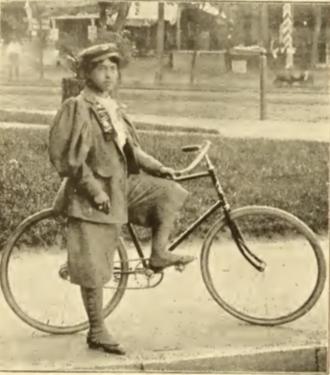Katherine Towle Knox (October 7, 1874 – October 11, 1900) was a bicycle racer and the first African American to be accepted into the League of American Wheelmen (LAW).
Kittie Knox | |
|---|---|
 Kittie Knox and bicycle | |
| Born | Katherine Towle Knox October 7, 1874 |
| Died | October 11, 1900 (aged 26) |
| Occupation | seamstress |
| Organization | League of American Wheelmen |
| Known for | cyclist |
Katherine Towle Knox (October 7, 1874 – October 11, 1900) was a bicycle racer and the first African American to be accepted into the League of American Wheelmen (LAW).[1]
Bicycling career
Knox joined LAW in 1893 at a time when few women were members.[1][2] The organization changed their constitution to only allow white members in 1894. In 1895 the organization clarified that constitutional changes were not retroactive, and Knox's membership in the group was no longer questioned.[3] Knox persisted in racing despite sometimes being denied access to races as well as service by restaurants and hotels while traveling.[1] She was a strong rider, participating in and completing several century rides.[4] Knox was known both for her cycling ability, taking first place in a LAW meeting Waltham, Massachusetts, as well as her fashionable cycling outfits.[5] During this time, women were expected to wear long skirts when engaging in physical activity. However, Kittie Knox defied gender norms by wearing baggy trousers when cycling. [6] Unlike her male counterparts, much attention was given to her appearance and wardrobe.[1] The media often paid more attention to her looks than to her abilities as a cyclist. [1]
Personal life
Knox was born to Katherine Towle, a white woman from East Parsonfield, Maine, who was a millworker, and John Knox, a black man from Philadelphia who worked as a tailor.[4] Kittie had one older brother, Ernest Knox, who worked as a steamfitter.[1] Kittie was born in Cambridgeport, Massachusetts, and moved to Boston with her family in the 1880s after her father died.[7] At the time, the Boston West End was an impoverished area and had limited opportunities for people of color. Knox found work as a seamstress, which allowed her to express her creativity and design her own cycling costumes.[1]
Knox died from kidney disease in 1900 at the age of 26 and was buried in Mount Auburn Cemetery in a public lot.[8] A headstone was erected for her by family members on September 29, 2013.[9]
Legacy
In 2019, the City of Cambridge, Massachusetts, named the Kittie Knox Bike Path after her. The path connects Broadway and Binney Street in Cambridge.[10][11]
In 2022, MassBike and partners began hosting an annual bike ride in honor of Kittie Knox. [12]
References
- ^ a b c d e f g Miller, Grace (May 26, 2020). "Breaking the Cycle: the Kittie Knox story – Smithsonian Libraries / Unbound". Smithsonian Libraries / Unbound. Retrieved June 13, 2020.
- ^ "Kittie Knox, Boston's Cycling Craze, 1880–1900: A Story of Race, Sport, and Society book cover". CONTENTdm. Retrieved June 13, 2020.
- ^ "Queries and Answers". Good Roads. 22: 34. July 1895. Retrieved June 13, 2020.
- ^ a b "African American Heritage Trail – Kittie Knox". Mount Auburn Cemetery. February 1, 2013. Archived from the original on June 7, 2021. Retrieved June 13, 2020.
- ^ "The Asbury Park Meet". The Bearings. 11 (24): 2. July 11, 1825.
- ^ "Women in Transportation History – Kittie Knox, African-American Cyclist". Transportation History. March 13, 2017. Retrieved April 16, 2024.
- ^ Boyd, Herb (November 24, 2022). "Kittie Knox of cycling fame and fashion". New York Amsterdam News. Retrieved April 16, 2024.
- ^ "Massachusetts, Town Clerk, Vital and Town Records, 1626–2001". FamilySearch. Massachusetts Secretary of the Commonwealth, Boston. p. 2. Retrieved June 13, 2020.
- ^ "African American Heritage Trail: A Monument for Kittie Knox". Mount Auburn Cemetery. September 30, 2013. Archived from the original on June 22, 2021. Retrieved June 13, 2020.
- ^ Fallacara, Noelle. "More bike lanes, reduced speed limits on horizon in Cambridge". Cambridge Chronicle & Tab. Archived from the original on June 13, 2020. Retrieved June 13, 2020.
- ^ "Ames Street Separated Bike Lane Project (Main St to Memorial Dr) – CDD – City of Cambridge, Massachusetts". www.cambridgema.gov. Archived from the original on June 13, 2020. Retrieved June 13, 2020.
- ^ https://www.bostonglobe.com/2022/06/05/metro/cyclists-honor-black-female-biking-pioneer-late-1800s/

